高中英语必修1人教版Friendship-Grammar and language points学案
人教版高中英语必修1 Unit1 Friendship Grammar(共52张PPT)
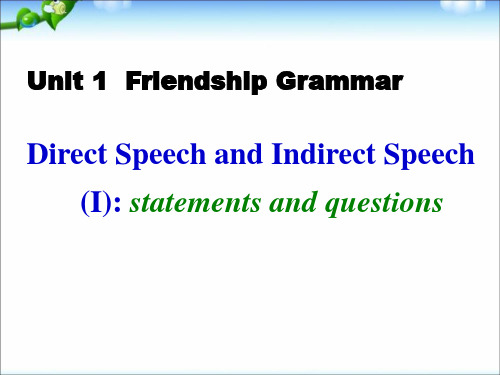
How to change direct speech into indirect speech?
a. Change what has been said to an object clause or an infinitive phrase;
2. 经常的习惯 He said to the doctor, “I smoke two packs every day.” → He told the doctor that he smokes two packs every day.
3. 历史事件 The teacher said, “World War II ended in 1945.” → The teacher said that World War II ended in 1945.
He said, “I lost a key here yesterday.” He said that he had lost a key there the day before/the previous day.
“I read the book here a week ago,” Jane said to him. Jane told him that she had read the book there a week before.
When do you harvest the wheat? (They asked him)
you harvest the wheat
They asked him when you harvest the wheat.
he harvveesstteedd
高中英语人教版必修1教案: unit1friendship grammar 教案(系列san)
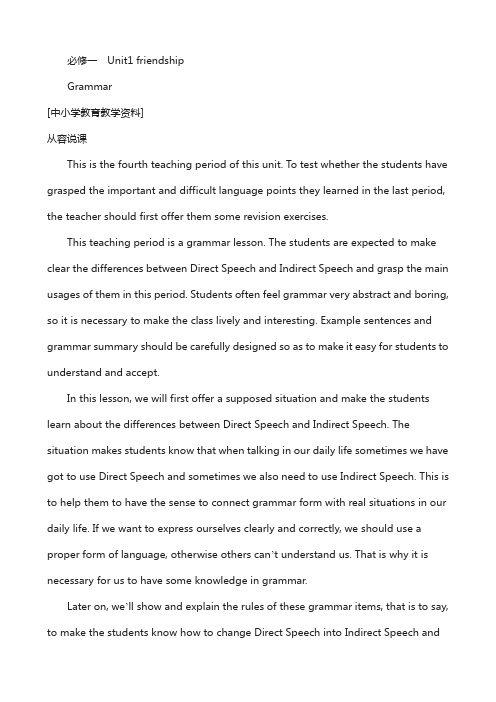
必修一Unit1 friendshipGrammar[中小学教育教学资料]从容说课This is the fourth teaching period of this unit. To test whether the students have grasped the important and difficult language points they learned in the last period, the teacher should first offer them some revision exercises.This teaching period is a grammar lesson. The students are expected to make clear the differences between Direct Speech and Indirect Speech and grasp the main usages of them in this period. Students often feel grammar very abstract and boring, so it is necessary to make the class lively and interesting. Example sentences and grammar summary should be carefully designed so as to make it easy for students to understand and accept.In this lesson, we will first offer a supposed situation and make the students learn about the differences between Direct Speech and Indirect Speech. The situation makes students know that when talking in our daily life sometimes we have got to use Direct Speech and sometimes we also need to use Indirect Speech. This is to help them to have the sense to connect grammar form with real situations in our daily life. If we want to express ourselves clearly and correctly, we should use a proper form of language, otherwise others can’t understand us. That is why it is necessary for us to have some knowledge in grammar.Later on, we’ll show and explain the rules of these grammar items, that is to say, to make the students know how to change Direct Speech into Indirect Speech and Indirect Speech into Direct Speech. Then ask them to do exercises in Discovering useful structures,Learning about language on Page 5. It will make the students further know about the differences and grasp the usages. This also can help the students connect grammar rules with proper language forms so as to make grammar rules less abstract.Then we will ask the students to do Exercise 1 in Using structures on Page 42. If the students have difficulty, help them and check their mistakes with the help of the grammar rules.Tell the students not just to learn some simple grammar rules but to learn and use them in practical situations.For example, my friend says, “I will come here tomorrow. ” If using Indirect Speech, you can express it in many different ways.1. If at the same time in the same place, you should say:My friend says she (he) will come here tomorrow.2. If the time has changed and still in the same place, you should say:My friend said she (he)would come here the next day.3. If the place has changed and the time is still today, you should say:My friend said she (he)would go there tomorrow.4. If both the time and the place have changed, you should say:My friend said she(he)would go there the next day. [中小学教育教学资料]5. If both the time and the place have changed, the other should say:He (She) said he (she) would go there the next day.If students learn the grammar this way, it is easier for them to grasp.教学重点Summarize the rules of Direct Speech and Indirect Speech.教学难点Get the students to learn about the special cases in which the tenses shouldn’t be changed.教学方法Discussing, summarizing and practicing教具准备A projector and other necessary teaching tools三维目标Knowledge aims: [中小学教育教学资料]Get the students to learn and grasp the rules of Direct Speech and Indirect Speech.Ability aims:Get the students to be able to use the rules to express their meanings and retail others’correctly. [中小学教育教学资料]Emotional aims: [中小学教育教学资料]1. Get the students not to be afraid of grammar learning.2. Get the students to develop their sense of group cooperation.教学过程→Step 1 Revision [中小学教育教学资料]1. Check the homework exercises.2. Have a dictation to write some important words and expressions. [中小学教育教学资料]Suggested words and expressions:upset ignore concern loose cheat reason share nature thunder entirelygo through hide away calm down set down grow crazy about on purpose face to face according to3. Translate some sentences using the patterns we have learned.Suggested sentences:1)为了上课不迟到,他七点钟就出发了。
高中英语必修1-unit1-friendship-grammar课件(人教新课标)
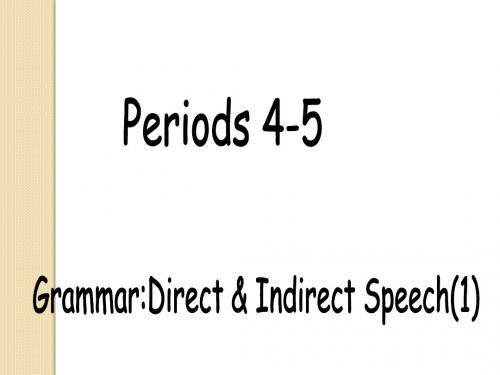
直接引语和间接引语
引述别人的话语一般采用两种方式: 一是原封不动地引用原话,把它放在括 号内,这叫直接引语(Direct speech);一 是用自己的话加以转述, 这叫间接引语 (Indirect speech)
直接引语变见解引语时, 时态要发生变化:
直接引语(变化前) 主句 动词 为一 般过 去时 引导动词为:
间接引语(变化后) 从句动词变为: 过去将来时 He said they would start the next day.
从句 一般将来时 动词 He said: 时态 “We shall 相应 start 变化 tomorrow.”
引导动词为:
从句 现在进行时 动词 “I’m 时态 making 相应 coffee for 变化 you all,” she said.
从句动词变为: 过去进行时 She said she was making coffee for us all.
直接引语(变化前)
间接引语(变化后)
主句 引导动词为: 从句 从句动词变为:
一般现在时 现在完成时 现在进行时 一般将来时 一般过去时
一般过去时 过去完成时 过去进行时 过去将来时 过去完成时
直接引语 (变化前) 陈述句
Jane said, “I’m very fond of traveling.”
间接引语(变化后)
that引导的宾语从句 Jane said that she was very fond of traveling.
D. he has walked…this week
4. The man thought, “I shall take it back tomorrow.” The man thought that __ take it back ____. A. I shall…tomorrow B. I shall…the next day C. he should…tomorrow D. he would …the next day
高中英语:unit1 friendship-grammar学案新人教版必修1 学案
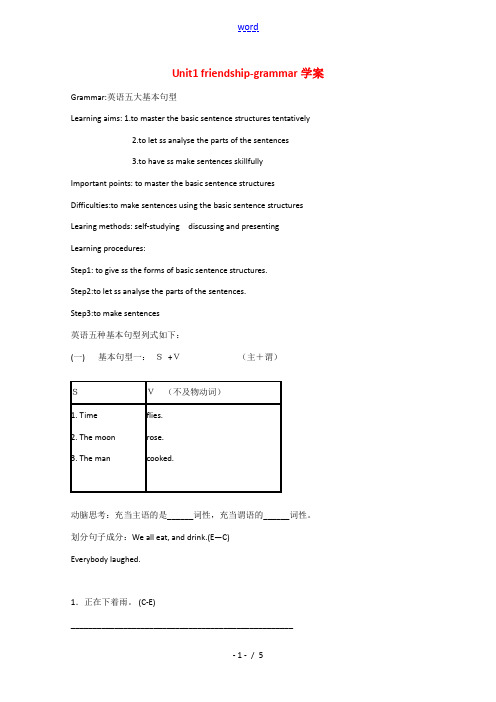
Unit1 friendship-grammar学案Grammar:英语五大基本句型Learning aims: 1.to master the basic sentence structures tentatively2.to let ss analyse the parts of the sentences3.to have ss make sentences skillfullyImportant points: to master the basic sentence structures Difficulties:to make sentences using the basic sentence structures Learing methods: self-studying discussing and presenting Learning procedures:Step1: to give ss the forms of basic sentence structures.Step2:to let ss analyse the parts of the sentences.Step3:to make sentences英语五种基本句型列式如下:(一) 基本句型一:S+V(主+谓)动脑思考:充当主语的是______词性,充当谓语的______词性。
划分句子成分:We all eat, and drink.(E—C)Everybody laughed.1.正在下着雨。
(C-E)___________________________________________________2.我的哥哥很用功。
___________________________________________________3.我每天早晨六点钟起床。
____________________________________________ _(二)基本句型二:S+V+P(主+系+表)动脑思考:充当表语的是_______词性(划分句子成分)He is tall and strong. (E-C)The weather became cool.His face turned red.1.下课了。
高一英语优质优秀课件:Unit Friendship-Grammar(新人教版必修1)

班主任: 我觉得何旋今天取得这样的成绩, 我觉得,很重要的是,何旋是土生土长的北京 二中的学生,二中的教育理念是综合培养学生 的素质和能力。我觉得何旋,她取得今天这么 好的成绩,一个来源于她的扎实的学习上的基 础,还有一个非常重要的,我觉得特别想提的, 何旋是一个特别充满自信,充满阳光的这样一 个女孩子。在我印象当中,何旋是一个最爱笑 的,而且她的笑特别感染人的。所以我觉得她 很阳光,而且充满自信,这是她突出的这样一 个特点。所以我觉得,这是她今天取得好成绩 当中,心理素质非常好,是非常重要的。
语文
小魔方站作品 盗版必究
“同课异构”杯2020年度教学技能大赛
一等奖获奖作品
Grammar
Direct and indirect speech
时态的变化:
1.当主句动词为一般现在时或现在完成时的时候,从句 动词时态不变。 1)She often says, “ All men and women are equal under the law.” 变为:She often says that all men and women are equal under the law. 2)“You did very well,” I have just told Tom. 变为:I have just told Tom that he did very well.
“同课异构”杯2020年度教学技能大赛
一等奖获奖作品
语文
小魔方站作品 盗版必究
谢谢您下载使用!
更多精彩内容,微信扫描二维码获取 扫描二维码获取更多资源
附赠 中高考状元学习方法
高考总分:
692分(含20分加分) 语文131分 数学145分 英语141分 文综255分
高中英语:Unit 1 Friendship Grammar(新人教必修1)

高中英语:Unit 1 Friendship Grammar(新人教必修1)部门: xxx时间: xxx制作人:xxx整理范文,仅供参考,可下载自行修改高一英语同步练习必修1 Unit 1 Friendship第3课时:GrammarI.基础练习:直接引语变间接引语注意要点:直接引语变成间接引语时,要注意以下几点:人称变化、时态变化、宾语从句要用陈述句语序。
直接引语如果是________、_________等,变成间接引语时,时态不变。
zfm30mFYKs时态变化的原则:如果主句谓语动词为各种现在时或一般将来时,则间接引语中的动词仍保持直接引语原来时态。
如果主句谓语动词为过去时,间接引语中的动词时态按下列变化: zfm30mFYKs<1)一般现在时变为_________<2)现在进行时变为_________<3)一般将来时变为_________<4) _________变为过去完成时<5)一般过去时变为_________<6)过去完成时不变,仍为过去完成时直接引语是陈述句,变成间接引语时,由连词that 引导.1. 陈述句“I don’t want to set down a series of facts in a diary.” Said Anne.zfm30mFYKs______________________________________直接引语是一般/选择疑问句,变成间接引语时,由连词whether或if 引导.2. 一般疑问句He asked, “Are you leaving tonight?”______________________________________直接引语是特殊疑问句,变成间接引语时,由相应的疑问词who, whom, whose, how, when, why, where 等引导。
zfm30mFYKs3. 特殊疑问句“When did you go to bed last night?” father said to Anne. zfm30mFYKs______________________________________代词等一般地应作相应的变化:指示代词 this ---that ; these--- those表示时间的词 now --- then ; today--- that day; thisweek(month ,etc> ----that week (month ,etc>; yesterday ----the day before;last week(month> --- the week(month> before;three days(a year>ago---three days (a year> before; tomorrow ----the next (following > day;next week(month> —- the next(following> week (month>zfm30mFYKs表地点的词 here --there动词 bring -- take ; come --goII. 单项填空:1. He said, "I am living with my brother." He said that __ was living with his brother. zfm30mFYKsA. IB. youC. heD. they2. He said, "You are sure to get a warm welcome there."zfm30mFYKsHe said that we _____ sure to get a warm welcome there. zfm30mFYKsA. amB. wasC. wereD. are3. She says, "Something is wrong with my bike."She says that something is wrong with _____ bike.A. myB.aC. hisD. her4. He said, "I will not do so again."He said that he _____ not do so again.A. willB. mustC. wouldD. do5. The teacher said, "My son had the same experience as the little boy." zfm30mFYKsThe teacher said that his son had _____ the same experience as the little boy. zfm30mFYKsA. beenB. haveC. hadD. done6. She said to me, "My mother took me to an exhibition yesterday." zfm30mFYKsShe told me that her mother had taken _____ to an exhibition the day before. zfm30mFYKsA. sheB. meC. herD. you7. You said to me, "I saw the film two days ago."You told me that you had seen the film _____A. two daysB. two days beforeC. two days agoD. yesterday zfm30mFYKs8. He said to his younger sister, "You may come with me." zfm30mFYKsHe told his younger sister that _____ with him.A. you may comeB. you might comeC. she might comeD. she might go zfm30mFYKs9. The student said to me, "She has made a close study of the problem." zfm30mFYKsThe student told me that she _____ a close study of the problem. zfm30mFYKsA. has makeB. have madeC. had makeD. had made zfm30mFYKs10. He said, "I live here."He said that he lived ______A. thereB. hereC.in thereD. at there11. The reporter said that the UFO _____ east to west when be saw it. zfm30mFYKsA.was travelling B.travelled C.had been traveling D.was to travel.zfm30mFYKs12. I wonder why Jenny _____ us recently. We should have heard from her by now. zfm30mFYKsA.hasn't written B.doesn't write C.won't write D.hadn't writtenzfm30mFYKs13. It is said in the book that Thomas Edison (1847-1931> _____ the world leading inventor for sixty years .zfm30mFYKsA.would be B.has been C.had been D.was 14. I _____ you not to move my dictionary---now I can’t find it. zfm30mFYKsA askedB askC was askingD had askedIII. 改错练习:1. He asked me why he has not received the letter.____________________________________2. Peter asked his mother where she was going next day. zfm30mFYKs____________________________________3. She told me that she had sent an e-mail about tenminutes ago.___________________________________zfm30mFYKs4. He asked how did you went there the day before yesterday. zfm30mFYKs____________________________________IV. 请选出正确的答案:1.“You’ve already got well, haven’t you?” she asked.→She asked _____zfm30mFYKsA. if I have already got well, hadn’t youB. whether I had already got wellC. have I already got wellD. had I already got well.2. He asked , “ Are you a Party member or a League member?”→He asked me _____zfm30mFYKsA. am I a Party member or a League memberB. was I a Party member or a League memberC. if was I a Party member or a League memberD. whether I was a Party member or a Leaguemember.zfm30mFYKs3. He asked, “How are you getting along?” →He asked_____zfm30mFYKsA. how am I getting alongB. how are you getting alongzfm30mFYKsC. how I was getting alongD. how was I getting alongzfm30mFYKs4. He asked me _____ with me.A. what the matter isB. what the mater wasC. what is the matterD. what was the matter5. He said, “Don’t do that again.” He _____ me_____ that again.zfm30mFYKsA. said to; not to doB. said to; don’t doC. told; don’t doD. told; not to do6. Can you make sure _____ ?A. that he will come here todayB. when he will come here todayzfm30mFYKsC. will he come here todayD. whether will he come here todayzfm30mFYKs7. Do you happen to know _____ ?A. where is her addressB. in which place is her addresszfm30mFYKsC. what her address isD. the place her address iszfm30mFYKs8. Excuse me, but can you tell me _____ ?A. where can I get to the libraryB. where I can get to the libraryzfm30mFYKsC. how can I get to the libraryD. howI can get to the libraryzfm30mFYKs9. John asked me _____to visit his uncle’s farm with him.zfm30mFYKsA. how would I likeB. if or not would I likezfm30mFYKsC. whether I would likeD. which I would likezfm30mFYKs10. I’d like to know _____ Chinese.A. when he began to learnB. when did he begin to learnzfm30mFYKsC. when did he begin learningD. for how long he began to learn zfm30mFYKsV. 将下列句子变为间接引语:11. Mr. Wang said, “I will leave for Shanghai on business next month, children”zfm30mFYKs→ Mr. Wang told _______ that he_______leave for Shanghai on business __________.zfm30mFYKs12. “I haven’t heard from my parents these days,” said Mary.zfm30mFYKs. → Mary said that _____ _________ from her parents________ days.zfm30mFYKs13. The geography teacher said to us, “The moon m oves around the earth and the earth zfm30mFYKsgoes round the sun.”→The geography teacher told us that the moon ______ around the earth and the earth _______ round the sun.zfm30mFYKs 14. “Have you anything interesting I can read, George?” she said. zfm30mFYKs→ She asked George ____he _____ anything interesting______ could read.zfm30mFYKs15. “Where are you going?” the father asked his son.zfm30mFYKs→ The father asked his son where _______going.16. “Don’t make so much noise in class, boys and girls,” said the teacher. zfm30mFYKs→ The teacher _____the boys and girls _____make so much noise in class.zfm30mFYKsVI. 把下列句子变为直接引语:17. She asked whether I would be free the next day ornot.zfm30mFYKs→ She asked , “ ______ will be free ______, won’t_____?”zf m30mFYKs18. I asked her where she was going and what she was going to do the next day.zfm30mFYKs→ I asked her, “Where______going and what ______ going to do ________?”zfm30mFYKs19. His father told him not to climb that high tree in his new coat.zfm30mFYKs→ His father said, “______ climb this high tree in_______ new coat.”zfm30mFYKs20.She said that she would finish her work the nextday.zfm30mFYKs→ “_______ finish my work ________,” she said.答案:I.基础练习:填空: 客观事实、普遍真理,(1> 一般现在时变为一般过去时<2)现在进行时变为过去进行时<3)一般将来时变为过去将来时<4)现在完成时变为过去完成时<5)一般过去时变为过去完成时直接引语变间接引语.1. Anne said that she didn’t want to set down a series of facts in a diary.zfm30mFYKs2. He asked us whether we were leaving that night.3. Father asked Anne when she went to bed the night before. zfm30mFYKsII、单项填空1-5 CCDCC 6-10 CBDDA 11-14 AADAIII. 改错练习:1. has改为had2.在next前加the3. ago 改为before4. 去didIV. 请选出正确的答案:1-5 BDCDD 6-10 ACDCAV. 将下列句子变为间接引语:11.Mr. Wang told the children that he would leave for Shanghai on business the next monthzfm30mFYKs12.Mary said that she hadn’t heard from her parents those days.zfm30mFYKs13.The geography teacher told us that the moon moves around the earth and the earth goes round zfm30mFYKsthe sun.14.She asked George if he had anything interesting she could read.zfm30mFYKs15.The father asked his son where he was going.16.The teacher told the boys and girls not to make so much noise in class.zfm30mFYKsVI. 把下列句子变为直接引语:17.She asked , “ You will be free tomorrow, won’t you?”zfm30mFYKs18.I asked her, “Where are you going and what are you going to do tomorrow?”zfm30mFYKs19.His father said, “Don’t climb this high tree in your new coat.”zfm30mFYKs20.“I’ll finish my work tomorrow,” she said.申明:所有资料为本人收集整理,仅限个人学习使用,勿做商业用途。
高中英语必修一unit1+Friendship+grammar%26writing+教案
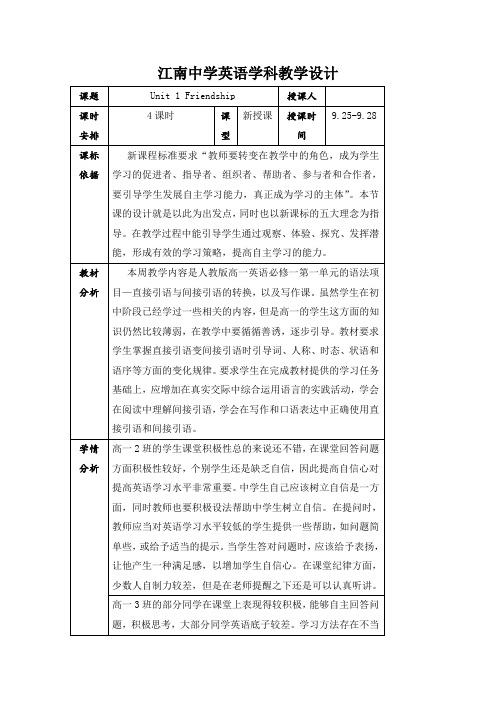
江南中学英语学科教学设计Step 2 Review1.Personal Pronoun2.Possessive Pronouns3.Do exercise 针对作业中大部分同学人称混乱的问题,进行一个补充讲解。
通过提问和复述的方式,师生一起共同回忆。
通过当堂的练习,巩固学生所学知识。
当堂检测有效练习一. 从括号内选择正确的代词填空1. Your clothes are on the desk.Please put _________(they,them,their,theirs) away.2. (We,Us,Our,Ours)_________ English teacher is Mrs. Green.We all like _________(she,her,hers).3. (I,Me,My,Mine)_________ can't get my kite.Could you help _________(I,me,my,mine)?4. Tom can't get down from the tree.Can you help _________(he,him,his)?5. Her kite is broken. Can _________(you,your,yours) mend it?作业布置填入正确的人称代词和物主代词1. This isn't her knife. _________ is green.2. These are your books,Kate. Put __________ in the desk,please.3. They want a football. Give __________ the green one,please.4. _____ is a boy. _____ name is Mike. Mike's friends like _____ very much.5. My father and mother are teachers. _____ are busy.6.You are a pupil. Is _____ brother a pupil, too?7. Mary works in a book store. ________likes________work very much.8. John and I are in the same school. ________go to school together.9. She is a friend of ________ . We knew each other two years ago.10. I have many friends. Some of ________are good at English.板书设计Review Lesson 1.Personal Pronoun2.Possessive Pronouns。
高中英语 Unit1 FriendshipGrammar课件 新人教必修1
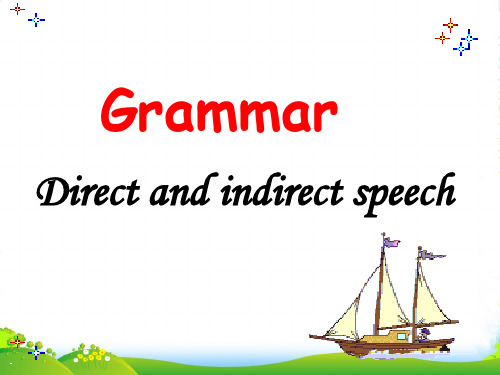
代词、形容词、副词、动词的变化。
this these now ago today tomorrow the day after tomorrow yesterday last night the day before yesterday go bring here
that/this those/these then before that day/today
The teacher said that World War II ended in
1945.”
4.部分情态动词,如must, ought to, used to, had better 等。
She said to me,” You must hurry up.”
She said that I must hurry up.
E. B. that it was true that he said
F. C. what did he say was true
G. D. what he said it was true
H. 6. Please tell me ____ from.
I. where do you come B. where you come
2. 主句谓语动词为一般过去时的时候,从句谓语
动词要发生相应的变化。
一般现在时
一般过去时
现在进行时
过去进行时
现在完成时
过去完成时
现在完成进行时 一般过去时
过去完成进行时
过去完成时
过去进行时
过去完成进行时
过去完成时
过去完成时
一般将来时
过去将来时
注意:下列情况时态不变。 1)不变的真理。 The teacher said to the students, ”Water freezes when the temperature falls below zero.” 改为:The teacher told the students that water freezes when the temperature falls below zero.
高中英语Unit1FriendshipSectionⅢGrammar教案新人教版必修1
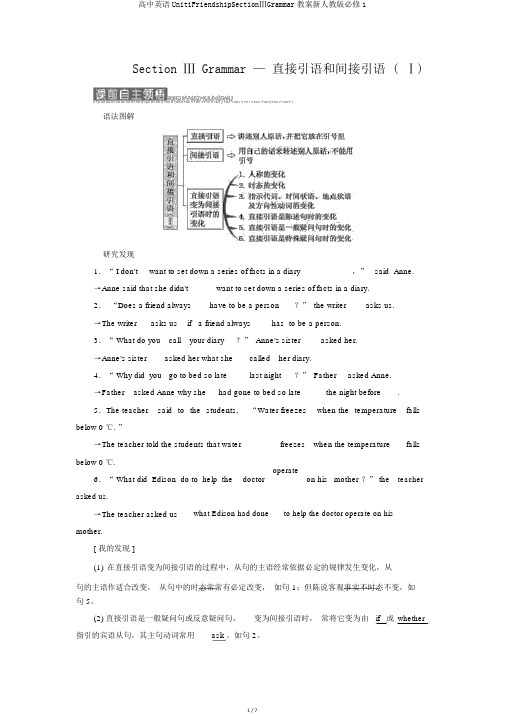
Section Ⅲ Grammar —直接引语和间接引语( Ⅰ)语法图解研究发现1.“ I don't want to set down a series of facts in a diary,”said Anne.→Anne said that she didn't want to set down a series of facts in a diary.2.“Does a friend always have to be a person?” the writer asks us.→The writer asks us if a friend always has to be a person.3.“ What do you call your diary?” Anne's sister asked her.→Anne's sister asked her what she called her diary.4.“ Why did you go to bed so late last night?” Father asked Anne.→Father asked Anne why she had gone to bed so late the night before.5.The teacher said to the students, “Water freezes when the temperature falls below 0 ℃. ”→The teacher told the students that water below 0 ℃.6.“ What did Edison do to help the doctorfreezesoperatewhen the temperatureon his mother ?” thefallsteacherasked us.→The teacher asked us what Edison had done to help the doctor operate on his mother.[ 我的发现 ](1)在直接引语变为间接引语的过程中,从句的主语经常依据必定的规律发生变化,从句的主语作适合改变,从句中的时态常常有必定改变,如句 1;但陈说客观事实不时态不变,如句 5。
新人教版高中英语必修1Unit 1 Friendship Grammar(含答案)
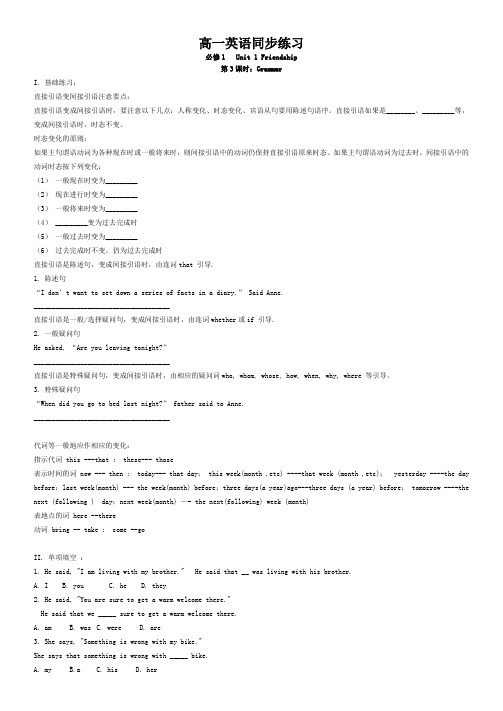
高一英语同步练习必修1 Unit 1 Friendship第3课时:GrammarI.基础练习:直接引语变间接引语注意要点:直接引语变成间接引语时,要注意以下几点:人称变化、时态变化、宾语从句要用陈述句语序。
直接引语如果是________、_________等,变成间接引语时,时态不变。
时态变化的原则:如果主句谓语动词为各种现在时或一般将来时,则间接引语中的动词仍保持直接引语原来时态。
如果主句谓语动词为过去时,间接引语中的动词时态按下列变化:(1)一般现在时变为_________(2)现在进行时变为_________(3)一般将来时变为_________(4) _________变为过去完成时(5)一般过去时变为_________(6)过去完成时不变,仍为过去完成时直接引语是陈述句,变成间接引语时,由连词that 引导.1. 陈述句“I don’t want to set down a series of facts in a diary.” Said Anne.______________________________________直接引语是一般/选择疑问句,变成间接引语时,由连词whether或if 引导.2. 一般疑问句He asked, “Are you leaving tonight?”______________________________________直接引语是特殊疑问句,变成间接引语时,由相应的疑问词who, whom, whose, how, when, why, where 等引导。
3. 特殊疑问句“When did you go to bed last night?” father said to A nne.______________________________________代词等一般地应作相应的变化:指示代词 this ---that ; these--- those表示时间的词 now --- then ; today--- that day; this week(month ,etc) ----that week (month ,etc); yesterday ----the day before;last week(month) --- the week(month) before;three days(a year)ago---three days (a year) before; tomorrow ----the next (following ) day;next week(month) —- the next(following) week (month)表地点的词 here --there动词 bring -- take ; come --goII. 单项填空:1. He said, "I am living with my brother." He said that __ was living with his brother.A. IB. youC. heD. they2. He said, "You are sure to get a warm welcome there."He said that we _____ sure to get a warm welcome there.A. amB. wasC. wereD. are3. She says, "Something is wrong with my bike."She says that something is wrong with _____ bike.A. myB.aC. hisD. her4. He said, "I will not do so again."He said that he _____ not do so again.A. willB. mustC. wouldD. do5. The teacher said, "My son had the same experience as the little boy."The teacher said that his son had _____ the same experience as the little boy.A. beenB. haveC. hadD. done6. She said to me, "My mother took me to an exhibition yesterday."She told me that her mother had taken _____ to an exhibition the day before.A. sheB. meC. herD. you7. You said to me, "I saw the film two days ago."You told me that you had seen the film _____A. two daysB. two days beforeC. two days agoD. yesterday8. He said to his younger sister, "You may come with me."He told his younger sister that _____ with him.A. you may comeB. you might comeC. she might comeD. she might go9. The student said to me, "She has made a close study of the problem."The student told me that she _____ a close study of the problem.A. has makeB. have madeC. had makeD. had made10. He said, "I live here."He said that he lived ______A. thereB. hereC.in thereD. at there11. The reporter said that the UFO _____ east to west when be saw it.A.was travelling B.travelled C.had been traveling D.was to travel.12. I wonder why Jenny _____ us recently. We should have heard from her by now.A.hasn't written B.doesn't write C.won't write D.hadn't written13. It is said in the book that Thomas Edison (1847-1931) _____ the world leading inventor for sixty years . A.would be B.has been C.had been D.was14. I _____ you not to move my dictionary---now I can’t find it.A askedB askC was askingD had askedIII. 改错练习:1. He asked me why he has not received the letter.____________________________________2. Peter asked his mother where she was going next day.____________________________________3. She told me that she had sent an e-mail about ten minutes ago. ___________________________________4. He asked how did you went there the day before yesterday.____________________________________IV. 请选出正确的答案:1.“You’ve already got well, haven’t you?” she asked. →She asked _____A. if I have already got well, hadn’t youB. whether I had already got wellC. have I already got wellD. had I already got well.2. He asked , “ Are you a Party member or a League member?”→He asked me _____A. am I a Party member or a League memberB. was I a Party member or a League memberC. if was I a Party member or a League memberD. whether I was a Party member or a League member.3. He asked, “How are you getting along?”→He asked _____A. how am I getting alongB. how are you getting alongC. how I was getting alongD. how was I getting along4. He asked me _____ with me.A. what the matter isB. what the mater wasC. what is the matterD. what was the matter5. He said, “Don’t do that again.” He _____ me_____ that again.A. said to; not to doB. said to; don’t doC. told; don’t doD. told; not to do6. Can you make sure _____ ?A. that he will come here todayB. when he will come here todayC. will he come here todayD. whether will he come here today7. Do you happen to know _____ ?A. where is her addressB. in which place is her addressC. what her address isD. the place her address is8. Excuse me, but can you tell me _____ ?A. where can I get to the libraryB. where I can get to the libraryC. how can I get to the libraryD. how I can get to the library9. John asked me _____to visit his uncle’s farm with him.A. how would I likeB. if or not would I likeC. whether I would likeD. which I would like10. I’d like to know _____ Chinese.A. when he began to learnB. when did he begin to learnC. when did he begin learningD. for how long he began to learnV. 将下列句子变为间接引语:11. Mr. Wang said, “I will leave for Shanghai on business next month, children”→ Mr. Wang told _______ that he_______leave for Shanghai on business __________.12. “I haven’t heard from my parents these days,” said Mary.. → Mary said that _____ _________ from her parents ________ days.13. The geography teacher said to us, “The moon moves around the earth and the earthgoes round the sun.”→The geography teacher told us that the moon ______ around the earth and the earth _______ round the sun.14. “Have you anything interesting I can read, George?” she said.→ She asked George ____he _____ anything interesting ______ could read.15. “Where are you going?” the father asked his son.→ The father asked his son where _______going.16. “Don’t make so much noise in class, boys and girls,” said the teacher.→ The teacher _____the boys and girls _____make so much noise in class.VI. 把下列句子变为直接引语:17. She asked whether I would be free the next day or not.→ She asked , “ ______ will be free ______, won’t _____?”18. I asked her where she was going and what she was going to do the next day.→ I asked her, “Where______going and what ______ going to do ________?”19. His father told him not to climb that high tree in his new coat.→ His father said, “______ climb this high tree in _______ new coat.”20.She said that she would finish her work the next day.→“_______ finish my work ________,” she said.答案:I.基础练习:填空: 客观事实、普遍真理,(1) 一般现在时变为一般过去时(2)现在进行时变为过去进行时(3)一般将来时变为过去将来时(4)现在完成时变为过去完成时(5)一般过去时变为过去完成时直接引语变间接引语.1. Anne said that she didn’t want to set down a series of facts in a diary.2. He asked us whether we were leaving that night.3. Father asked Anne when she went to bed the night before.II、单项填空1-5 CCDCC 6-10 CBDDA 11-14 AADAIII. 改错练习:1. has改为had2.在next前加the3. ago 改为before4. 去didIV. 请选出正确的答案:1-5 BDCDD 6-10 ACDCAV. 将下列句子变为间接引语:11.Mr. Wang told the children that he would leave for Shanghai on business the next month12.Mary said that she hadn’t heard from her parents those days.13.The geography teacher told us that the moon moves around the earth and the earth goes round the sun.14.She asked George if he had anything interesting she could read.15.The father asked his son where he was going.16.The teacher told the boys and girls not to make so much noise in class.VI. 把下列句子变为直接引语:17.She asked , “ You will be free tomorrow, won’t you?”18.I asked her, “Where are you going and what are you going to do tomorrow?”19.His father said, “Don’t climb this high tree in your new coat.”20.“I’ll finish my work tomorrow,” she said.。
人教版高中英语必修一教案:Unit1FriendshipGrammar2

必修一Unit1 FriendshipGrammarA. Teaching content and analysisTeaching content:learn to use the present Progressive tense to express future plansTeaching analys is:grammar learning is an important part in language leaning, the present Progressive tense has multiple usage. In this unit we know it can show future actions.B. Teaching aimsTo enable students to use the present Progressive tense to express future plansC. Teaching methods1.3P (presentation practice production)model;2. TBLT method (total situation action and task-based language teaching)D. Teaching proceduresDictation — Discovering useful structures —grammar— summary.Step1 have a dictationDesigning purpose:to check whether students grasp the useful wordsStep 2To observe the following sentences and make conclusion about the usage of the direct speech and indirect speech.1. She often says, “ All men and women are equal under the law. ”She often says (that) all men and women are equal under the law2.“ I like reading stories, ” said John.John said that he liked reading stories.3.“ I don ’ t like cars, ” Sarah said to him.Sarah told him that she didn ’ t like cars.1.直接引语转变成间接引语时 , 从句由 that 指引 , 可省略 ; 主句动词为一般未来时或此刻时 , 从句动词时态不变。
高中英语 Unit1 Friendship Grammar(Period6)学案 新人教版必修1

高中英语 Unit1 Friendship Grammar(Period6)学案新人教版必修1Friendship Grammar(Period6)学案新人教版必修1【要达成的目标】1、Make sure the students can use direct speech and indirect speech freely and correctly、【“教”与“学”过程】本堂课使用的电教手段 Task1 Individual work before class、1、Go over the rules about direct speech and indirect speech、2、 Finish Ex2 on page5 of the textbook、Task2 Group work in class、1、Discuss the answers to Ex2 on page5、 If there is any problem, turn to the teacher for help、2、Play a game “What did he / she say?”、 Form groups of three and carry on conversations like this、Remember to change roles、 A: When did you get up this morning? B: What did he / she say? C: He / She asked you when you got up this morning、Task3 Pair work、 Page5 Ex3、 Make up dialogues using indirect speech、Task4 Individual work、1、Complete the following sentences、1)、 Mr、 Black said, “I have walked a long way this week、”Mr、 Black said that ________ a long way ________、2)、 The teacher asked her, “Does the sun rise in the east ?” The teacher asked her _____ the sun _____ in the east、3)、They said to us, “Are you afraid to leave thishouse ?”They asked us ________ afraid to leave _____ house、4)、Jane said, “What did he hear about a week ago?” Jane asked ___________ about _________、5)、 She asked, “Whose house will he break into next time ?”She asked whose house __________ break into __________、6)、The man thought, “I shall take it back tomorrow、” The man thought that _________take it back _________、2、 Choose the proper answer 、1)、 After the examination, my teacher told me that failure ______ the mother of success、A、 beB、 wasC、 isD、 are2)、 He came to me and asked ______、A、 what is the matterB、 what the matter isC、 what was the matterD、 what the matter was3)、 Black asked me why ____ yet、A、I had n’t left thereB、I haven’t left hereC、hadn’t I left thereD、haven’t I left here4)、 He said that his car______ stolen and he ______ have to telephone thepolice、A、 was; wouldB、 had been; willC、 has been; willD、 had been; would5)–Who called j ust now, Tom?It’s Mary、 She asked______、A、 that Jim was inB、 whether Jim was inC、 if was Jim inD、 whether Jim is in6)、 My friends asked me _____ I would go to Shanghai by air or by train、A、 that ifB、 howC、 whetherD、 if that7)、 Can you tell me ______ the railway station、A、 how I can get toB、 how can I get toC、 where I can get toD、 where can I get to8)The professor _____ that he _____ glad to visit our school、A、 asked; wasB、 said; wasC、 told; wasD、 said; has been Homework1、Finish the Exx in the exercise-book、2、 Prepare for the next class、【课后反思】(教师写成败得失和改进措施,学生写学习体会和存在的问题)【课后反思】(教师写成败得失和改进措施,学生写学习体会和存在的问题) Using language Reading, Listening and Speaking (Perio【要达成的目标】1、Develop Ss’ abilities of reading, listening, speaking。
高中英语人教版必修1教案: unit1friendship grammar 教案(系列一)
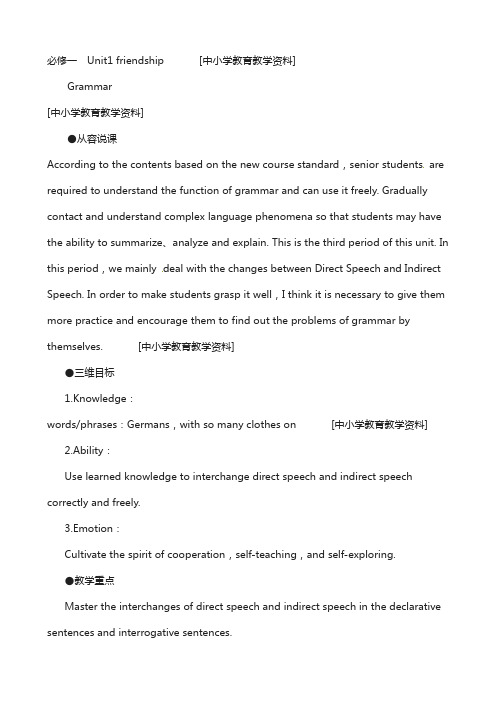
必修一Unit1 friendship [中小学教育教学资料]Grammar[中小学教育教学资料]●从容说课According to the contents based on the new course standard,senior students are required to understand the function of grammar and can use it freely. Gradually contact and understand complex language phenomena so that students may have the ability to summarize、analyze and explain. This is the third period of this unit. In this period,we mainly deal with the changes between Direct Speech and Indirect Speech. In order to make students grasp it well,I think it is necessary to give them more practice and encourage them to find out the problems of grammar by themselves. [中小学教育教学资料]●三维目标1.Knowledge:words/phrases:Germans,with so many clothes on [中小学教育教学资料]2.Ability:Use learned knowledge to interchange direct speech and indirect speech correctly and freely.3.Emotion:Cultivate the spirit of cooperation,self-teaching,and self-exploring.●教学重点Master the interchanges of direct speech and indirect speech in the declarative sentences and interrogative sentences.●教学难点Master the changes of the pronouns,tenses,adverbials in the interchanges of direct speech and indirect speech.●教具准备a computer connected to the internet,a project,a blackboard●教学过程[中小学教育教学资料]Step 1 GreetingsGreet the whole class as usua l.Step 2T:Now I want you to translate two sentences into English. Listen carefully.“我喜欢交朋友”,the second one “妈妈,你看见我的笔记本了吗?”Now how to translate the two sentences?Who wants to try?Yeah,Alice,you try,please. The first one.S:I like making friends.T:Good,sit down,please. Alice said,“I like making friends”(Bb:Alice said,“I like making friends.”)[中小学教育教学资料]The second one. Who wants to try?OK,David,you try,please.S:Mum,have you seen my notebook?(Bb:David asked,“Mom,have you seen my notebook.”)T:Now look at the blackboard. If we report what Alice and David said to someone else,how to do it?T and Ss:Alice said that she liked making friends.David asked his mum if she had seen his notebook.(Bb:Write them on the blackboard.)T:Yes. Let’s come to our text. Read the sentences in exercise 1 of discovering structures. Later I’ll ask you to tell me what you’ve discovered. Now,who can tell me?S1:We should pay attention to the changes of tenses. Look at the underlined words.S2:We should pay more attention to the second sentence. In direct speech,it’s a general question. But in indirect speech,we should use if or whether to introduce object clause besides the change of verb.S3:If it is a special question in direct speech,we should use the original interrogative in indirect speech.T:Wonderful! Now I’ll give you brief explanation of “Direct Speech and Indirect Speech”(1):Statements & Questions☆You use Direct Speech when you want to show the exact words someone said or wrote. Use quotation marks to show th at you report the exact words a person used and a reporting clause to include information about the speak and the situation.e.g.“I had a great time at the picnic,” she told her mum.(direct speech)(reporting clause)☆The reporting clause may come before,within,or after the direct speech. When the reporting clause comes after the direct speech,the order of the subject and the verb may be changed,e.g. Jane said/said Jane. This typically happens when the reporting clause is within the reported speech and the subject is not a pronoun.e.g.Jane said,“I’ve got a new e-pal. He is from German.”“I’ve got a new pal. He is from Germany,” Jane said/said Jane/she said.Use a comma to connect the direct speech and the reporting clause.When you change a sentence from Direct Speech to Indirect Speech,you sometimes need to change the verb tense. You may also need to change pronouns in order to keep。
Unit 1 Friendship-Grammar[人教新课标必修一课件]
![Unit 1 Friendship-Grammar[人教新课标必修一课件]](https://img.taocdn.com/s3/m/b72cb52d87c24028915fc3c4.png)
直接引语和间接引语
Michael Phelps
“I have a long body and long arms, a gift and love for swimming.”
Phelps said he had a long body and long arms, and a gift and love for swimming.
“I started swimming at an young age in order to treat my ADHD disease.”
Phelps said he had started swimming at an young age in order to treat his ADHD disease.
Exercise I
1. “I like reading adventure stories,” said John. John said that he liked reading adventure stories. 2. “I don’t like computers,” Sarah said to her friend. Sarah told her friends that she didn’t like computers.
2. We said to her, “They’re walking through the street now.” We told her that ___ through the street ___. A. we were walking…then B. you are walking…now C .they were walking…then D. they walking…now
- 1、下载文档前请自行甄别文档内容的完整性,平台不提供额外的编辑、内容补充、找答案等附加服务。
- 2、"仅部分预览"的文档,不可在线预览部分如存在完整性等问题,可反馈申请退款(可完整预览的文档不适用该条件!)。
- 3、如文档侵犯您的权益,请联系客服反馈,我们会尽快为您处理(人工客服工作时间:9:00-18:30)。
Friendship-Grammar and language points学案直接引语和间接引语(Ⅰ)1.He said,“I’m going to see a film this afternoon.”→2.He said that he was going to see a film that afternoon.3.Jack said to me,“I have waited for you for a long time.”→4.Jack told me that he had waited for me for a long time.5.The teacher said to us,“We will have an English party next week.”→6.The teacher told us that we would have an English party the next week.当我们用引号引出别人的原话时,被引用部分称为直接引语,如上面的1、3、5中都用了直接引语。
当我们间接地把别人的意思转述出来时,被转述的部分称为间接引语,如上面的2、4、6中都用了间接引语。
由以上例句可以体会出,直接引语变为间接引语时,人称、时态、指示代词、时间状语、地点状语和动词都会发生变化,现总结如下:【提醒】下列情况下,直接引语变间接引语时时态不变。
(1)直接引语如果陈述的是客观事实或真理,当其变为间接引语时,不管主句用什么时态,间接引语的时态都不变。
The teacher told the students,“The earth goes around the sun.”→The teacher told the students that the earth goes around the sun.(2)直接引语中有明确的表示过去时间的状语时,变间接引语时,其时态仍保持过去时。
The girl said,“I was born in Hong Kong in 1990.”→The girl said that she was born in Hong Kong in 1990.(3)主句的谓语动词是一般现在时或将来时,变间接引语时,时态通常不变。
The old gentleman often says,“Time is life.”→The old gentleman often says that time is life.3.人称代词的变化(1)“一随主”。
若直接引语中有第一人称,变间接引语时应与主句中主语的人称相一致。
(2)“二随宾”。
若直接引语中有第二人称,变间接引语时应与主句中宾语的人称相一致。
(3)“第三人称不更新”。
直接引语中的第三人称变间接引语时不需要变化。
4.疑问句直接引语变间接引语(1)直接引语为一般疑问句,变成间接引语时,常用if或whether引导,引述动词用asked,没有间接宾语的可以加一个间接宾语me,him 等。
He asked me,“Are you good at English?”→He asked me if/whether I was good at English.(2)反意疑问句变间接引语时,只能用whether来引导。
(3)特殊疑问句变间接引语时,用原句中的疑问词作连词,将句子改为陈述语序。
The teacher asked the boy,“Why are you late again?”→The teacher asked the boy why he was late again.I asked her,“When did you come here?”→I asked her when she had been there.5.直接引语变间接引语时,还要注意几种特殊情况:(1)陈述句由直接引语变为间接引语时,如果有两个或两个以上的宾语从句并列时,仅能省略第一个that,其余的均不可省略。
He said,“I want to visit the Great Wall,and my father will go with me then.”→He said (that) he wanted to visit the Great Wall and that his father would go with him then. (2)直接引语是祈使句时,变间接引语时常变为ask/tell/order sb.to do sth.句型。
如果是以let’s开头的祈使句,则通常变为suggest doing 或suggest+that 从句。
“Do it again.”the teacher said to us.→The teacher told us to do it again.(3)直接引语中有when,since,while引导的从句,在变为间接引语时,只改变主句的时态,从句的时态不变。
(4)如果在当地转述,here不必变为there,come不必变为go;如果在当天转述,则today,yesterday,tomorrow等时间状语也不必变化。
(5)有的疑问句并非提出疑问,而是表示请求、建议、劝告等意义。
引述这类疑问句时,通常用“ask/advise/want+宾语+不定式”的结构,表示建议时,通常用“suggest+动名词”等结构。
Mr.Green asked,“Shall we go to Beijing to watch the Olympic Games?”→Mr.Green suggested going to Beijing to watch the Olympic Games.Ⅰ.句型转换1.He said to me,“I broke your CD player yesterday.”He told me that he had broken my CD player the day before.2.He said to me,“What can I do for you?”He asked me what he could do for me.3.He said,“I haven’t seen these children by now.”He said that he hadn’t seen those children by then.4.He asked me,“Can I go to see her tomorrow?”He asked me if he could go to see her the next day.Ⅱ.把下列直接引语变为间接引语或间接引语变为直接引语1.“We’ve lived there for two years,”he told me.He told me that they had lived there for two years.2.“I was here a few weeks ago,”she said.She said she had been there a few weeks before.3.“I went to university in the 1960s,”Wang Hua told his students.Wang Hua told his students that she/he went to university in the 1960s.4.The teacher asked Wang Ying why she hadn’t gone to school the day before.“Why didn’t you go to school yesterday?”the teacher asked Wang Ying.Language Points1.I am having some trouble with my classmates at the moment.目前我和我的同学有矛盾。
Do you have any trouble with your new job?你的新工作有麻烦吗?I don’t want to have any trouble with my family.我不想和我的家人之间有任何麻烦。
have trouble with sth.意为在某方面有困难/麻烦,其中trouble为不可数名词,也可换为difficulty。
have trouble with...某人/某事使人伤脑筋、苦恼;跟(某人)闹别扭have difficulty with sth.=have trouble with sth.在……方面有困难/麻烦have difficulty/trouble (in) doing sth.在……方面有问题/困难have problems/a problem with sth.在……方面有问题He had no difficulty (in) working out the problem. 他没有费事就做出了那道题。
(1)She’s had a lot of trouble with her husband (跟丈夫闹意见).(2)I’m sorry you are having trouble in making friends (在交友方面有麻烦).2. I’m getting along well with a boy in my class.我和我班的一个男生相处得很好。
The girl is difficult to get along with.这个女孩很难相处。
I can get along well with my classmates.我能和同学们融洽相处。
—How are you getting along with your studies?——你的功课学得怎样?—V ery well.——很好。
get along with意为与……相处;某事进展得……,其中along也可换为on,其后可用well,nicely,badly等修饰语,表示同某人相处得好(不好),某事进展得(不)顺利。
(1)一切进展顺利吗?Is everything getting along/on well?(2)你的新书写得怎么样了?How are you getting on with your new book?(3)我们班里的学生相处得都很融洽。
The students in our class get along/on very well with each other.3. They say that this boy and I have fallen in love.他们说我和这个男生在谈恋爱。
